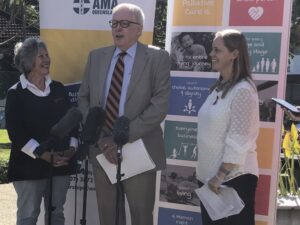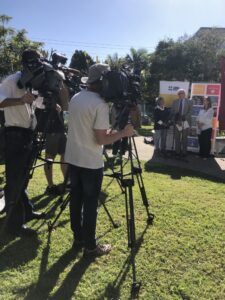Palliative Care Queensland has welcomed the growing calls for significant increases in state government funding for the palliative care sector, joining with AMA Queensland in calling for an extra $275million per year ahead of the potential introduction of voluntary assisted dying (VAD) laws.

At the start of National Palliative Care Week, Palliative Care Queensland CEO Shyla Mills said it was critical that palliative care, which had been historically underfunded by successive state governments, was adequately funded to ensure that all Queenslanders with a terminal illness had true choice to access proper care in their last days, weeks, months and years.
This was even more important with VAD laws set to be introduced in Queensland Parliament during National Palliative Care Week.
“AMA Queensland joined with us and the Queensland Palliative Care Medical Directors Group last year in reviewing current funding of the palliative care sector and in devising what would be required for palliative care system reform,” said Ms Mills.
“We calculated that an extra $275million per year was required to reach the World Health Organisation definition of palliative care and provide equal access to palliative care (from diagnosis to bereavement) for all Queenslanders living with a terminal illness and their loved ones.
“Access to palliative care is very much a lottery in Queensland now and sadly the quality of care can very much depend on where you live and your postcode, especially when most people say they want to die at home when they receive a terminal diagnosis.
“Even with a state election promise of an extra $28.5million per year in palliative care funding by the Queensland government from next year – and we are yet to have clarity of how this proposed funding will be spent. But even with that, it still leaves a shortfall of $247million per year.”
Ms Mills joined AMAQ President, Professor Chris Perry at a joint media conference today at Karuna Hospice at Windsor on Brisbane’s northside, along with Mrs Loody Stewart, whose son Charles receive excellent home-based palliative care before his death in 2016 at the age of just 27.
Mrs Stewart said receiving great palliative care from Karuna while he was being treated at home (Charles was born with cystic fibrosis), allowed Charles to walk his final journey surrounded by family and friends and with his beloved dog at his bedside.
“Charles required specialist care that is most often delivered in a hospital setting. Medicines needed to be administered, syringe drivers need to be changed and Charles and our family supported. Charles could not have had this precious time without the holistic palliative care provided by Karuna at home,” she said.
“Our Karuna nurses Millie and Cora would tend lovingly to all his medical needs as well as liaising with all of Charles’ medical practitioners. They became important family members, knowing how to comfort me when I felt overwhelmed and supporting close family and friends.
“Karuna volunteers would come and go, doing the washing, ironing, tidying and staying at home with Charles when I needed some air. I was able to focus entirely on Charles up until his death.”
Ms Mills said palliative care was a choice all Queenslanders deserved, but it was not currently a choice available for all Queenslanders.
“Providers of care such as Karuna, often have to close their books or reduce the eligibility to access the service due to funding gaps and many regional areas do not have access to any palliative care services or hospices which you find in south-east Queensland,” she said.
“If voluntary assisted dying becomes legal in Queensland, we estimate that, less than 1% of the population would be eligible, but 100% of the population could benefit from excellent palliative care.
“We know what is needed, we have provided a blueprint for system transformation, and it simply can’t remain underfunded. True choice is needed for all Queenslanders.”
Read the full media release here




